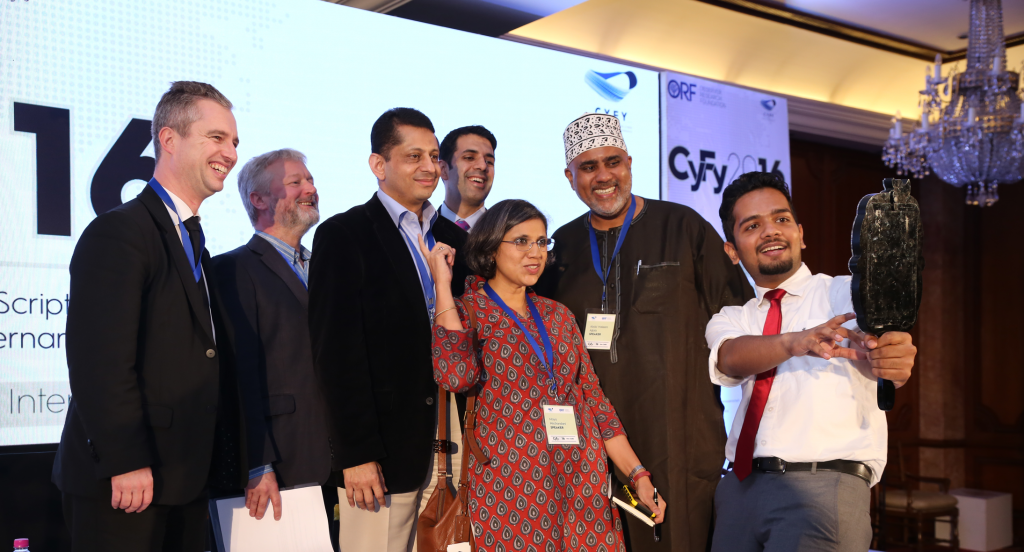Syed Munir Khasru, Chairman, IPAG participated in the South Asian Green Energy Summit (SAGE) Summit held in New Delhi, India. He spoke during the session on “Innovation and Technology” which discussed the technology innovations required to ensure that the transition from heavy use of fossil fuels to a greener power mix is seamless in South Asia.
The Shared Value Summit was conducted in Mumbai on the theme “Goals to Transform Our World”.Syed Munir Khasru moderated a panel discussion on“Advocating the power of clusters in enhancing regional economic development and investigating the linkages between innovation capabilities and cluster formation”.
At the Global Dialogue Security Summit held in New Delhi, Syed Munir Khasru spoke during the session on “Security Challenges in the Indo Pacific Region”, organized by Konrad-Adenauer-Stiftung. During the discussions, he highlighted China’s increasing footprint in South Asia through its investments in ports in Sri Lanka, Myanmar, Bangladesh, Pakistan and Maldives. While India has a vision, it is still to craft a comprehensive strategy on how to use its soft power for its strategic goals.
Syed Munir Khasru spoke during the workshop on “Digital economy and how can it transform Asia?” organized by the Asian Development Bank Institute (ADBI), ASEAN-India Center (AIC), and Research and Information Systems for Developing Countries (RIS). He also moderated two sessions on “Securing the digital economy – focus on trust, privacy and transparency” and “Policies to promote and manage the digital economy”.
Mr. Khasru spoke at the 10th IDSA South Asia Conference: Strengthening Connectivity in South Asia, organized by the Institute for Defense Studies & Analyses (IDSA) in New Delhi. He shared his thoughts on ‘Connectivity in South Asia: Opportunities, Potentials & Challenges’ and ‘Towards an Integrated South Asia’.
Institute of Social and Cultural Studies (ISCS), in association with Research Information Systems (RIS), Indira Gandhi National Centre for Arts, Maulana Abul Kalam Azad Institute of Asian Studies and Nehru Memorial Museum Library organized this international conference on “Indo-Bangladesh Multi Sectoral Cooperation” on in New Delhi. Mr. Syed Munir Khasru, spoke in the plenary session on “Security Challenges to Indo-Bangladesh Relations”
Research and Information System for Developing Countries (RIS), Ministry of External Affairs, Government of India organized the IORA Blue Economy Dialogue in New Delhi. This dialogue brought together policy makers, academicians, diplomats etc. from different countries and provided a platform to discuss the opportunities and challenges in promoting blue economic activities and industries. Tanvir Ahmed Khan, Senior Research Associate, IPAG spoke during the session on “Coastal Tourism and Urbanization”. The dialogue also highlighted the key sectors and dimensions of blue economy and made a stocktaking of the previous dialogues.

The India Conference on Cyber Security and Internet Governance is a platform which brings policy makers, experts and researchers from all over the world to discuss digital policy solutions. The conference had sessions on Digital Economy, International Engagement, Cyber Security, Access & Inclusion, and Capacity Building. Mr. Khasru spoke during the session on “Countering Violent Extremism in Cyberspace”. He highlighted the role of technology in global cyber regimes, as well as that of non-state actors in the cyberspace.
During the 3rd North East Connectivity Summit held in Agartala, India, Mr. Khasru presented the Keynote Paper at the Policy Maker’s Forum for the Chief Ministers and MPs of North Eastern States of India. IPAG was the Policy Research Partner of the Summit. The Summit had threadbare discussion on formulating a comprehensive connectivity road map and the importance of active private sector participation in the growth agenda for the region.


Gateway House, India in collaboration with India’s Ministry of External Affairs, and in partnership with China’s Institute for World Economics and Politics (China Academy of Social Sciences), Chongyang Institute of Financial Studies (Renmin University) and Shanghai Institute of International Studies, organized the G20’s consultative meeting with the leading think tanks in the conference titled “T20 meeting: Global Economic Governance” in Mumbai. Mr. Khasru joined various scholars from regional think tanks, and diplomats from G20 countries and government officials from India during the meeting.


“The Gateway of India Dialogue: Where Geopolitics Meets Business”, India’s first major foreign policy conference, was co-hosted by Gateway House and Ministry of External Affairs, Government of India. The conference highlighted the role of economic diplomacy and corporate engagement in promoting India’s strategic and commercial interest.
Mr. Khasru spoke during the session on “Innovating for Asian Integration” addressing basic social realities such as access to education and healthcare, and a change in mindset for driving Asian innovation forward. He emphasized the need for Asia to focus on social innovation.


The conference on South-South Corporation (SSC) was jointly organized by Forum for Indian Development Cooperation (FIDC), Ministry of External Affairs, Government of India, Research and Information for Developing Countries (RIS) and United Nations (UN). The conference deliberated on the growing importance of SSC in developing countries and the major challenges and issues of concerns of SSC. Mr. Khasru spoke during the session on SSC and “One World Global Citizenship”. He discussed about some of the challenges ahead of SSC and proposed the “COLD” (Connect, Organize, Learn and Develop) model that was much appreciated for its ingenuity in meeting the objectives of the SSC.


The South Asia Economic Conclave was organized by the Department of Commerce, Ministry of Commerce and Industry, Government of India, the Confederation of Indian Industry (CII), the World Bank Group, national chambers of commerce of member countries, and similar associations to foster shared growth and prosperity through regional economic integration. Mr. Khasru shared his thoughts during the session on ‘Writing a New Chapter Through People-to-People Contacts’.